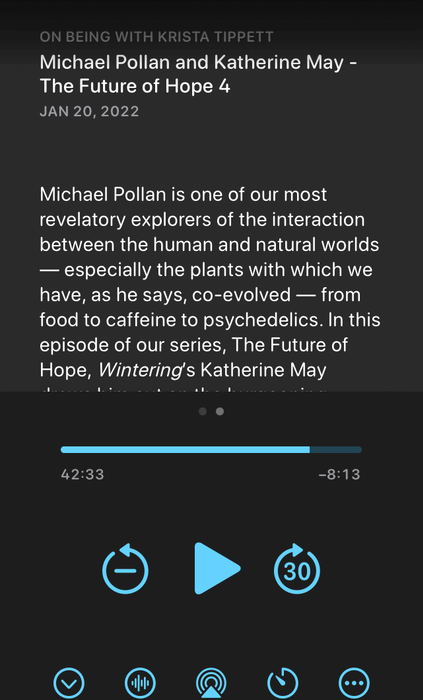Do you know what Kessler Syndrome is? You should.
ɕ
Do you know what Kessler Syndrome is? You should.
ɕ

Sometimes I see a moment that’s worth capturing.
ɕ
This is a rich conversation around validation vs. reassurance, which I recently revisited. Go listen. (Seth Godin and Brian Koppelman, 7/7/2015, from The Moment podcast—from over 10 years ago, back catalog for the win!)
I recently re-listened. Then I took the audio file, had a transcript generated (from otter.ai), passed it to Claude.ai who wrote me a magnificent list of takeaways. I’ve been reading over them, thinking about them, and weaving the ideas into my thinking.
But I’m not publishing those takeaways because that would be devaluing Koppelman’s and Godin’s work. AI is a power tool which I use for various things. (For example, I use it to help me write show notes for my podcast episodes, which I do publish in full.) But I blog here to help my thinking (and in this case to encourage others to listen to a great podcast episode.)
I’m not trying to give you all the gems all polished up from something someone else created. If you want the gems, go listen; Find your way to get the gems. Because the gems are only valuable if you dig them out and polish them yourself.
ɕ
The other morning I was spun off on a tangent. I was writing a blog post about a Godin/Koppelman podcast episode. I know full well you cannot link to episodes, so I just said the usual “go search…”
I sometimes give my blog post drafts to Claude.ai for critique. For this piece, it pointed out I should just link to the episode… cue my frustration. It’s a valid critique, and I don’t fault that Claude instance for not understanding the reality . . .
So we talked about it until it did understand. Then I told it to write me a prompt (because I didn’t want my writing critic going farther afield) for a Claude-code instance. It took Claude-code about 10 minutes to do the work, which I posted publicly for discussion:
Why you can’t link to a podcast episode
I particularly LOVE its list of sources; There’s so much great reading in there.
Its analysis actually surprised me. I had assumed this was a technical problem. It’s not.
There was a time when I’d make a web site, email people (eg James Cridland), and start trying to rally people into fixing something. But those days need to be behind me, I simply cannot take on another new thing.
My hope? Someone somewhere sees that topic over on the Podtalk Community. Learns something about the problem and gets energized to do something about it.
I love podcasting, but this isn’t a fight I can lead.
Maybe you can?
ɕ
This year’s cynosure is “Temperance.”
There was a great deal of journaling and conversation with Claude.ai about selecting 2026’s cynosure. Many times I thought about writing a blog post about the process of choosing…
As I watched December move along, I realized that if it’s going to be temperance, then it’s temperance in all things. Particularly in blog posts.
ɕ

Here’s what sounds wrong but turns out to be true: writing more actually creates less work.
When you feel overwhelmed, the last thing you want to do is add another task. Writing things down feels like more work piled on top of everything else you’re already not getting done.
But here’s what actually happens when you don’t write things down: You think about the same problem multiple times. You have the same realization three different times and forget it twice. You start working on something, realize you don’t know the next step, stop, and come back to it later only to re-figure out where you were.
That’s exhausting. And it’s way more work than writing things down.
Writing is slower than thinking. That’s actually the point. When you write, you can only hold one thought at a time. You have to finish the sentence before you start the next one. This forced slowness makes you think more clearly about what you’re actually trying to say.
And once it’s written down, you don’t have to hold it in your head anymore.
More writing = clearer thinking = less total effort.
It sounds backwards until you try it.
ɕ
This is the first in a series of posts about Hand-Write. Think Better.—a method for people who feel overwhelmed to start simply writing more on paper. Get the book →
Not ready for the book? Grab the free one-page quick reference—it covers the entire method on a single sheet. Download the PDF →
The richness and meaning arises in part from choosing it at the expense of all other places you could be and things you could be doing. Accepting a place’s shortcomings, the things it lacks, and its imperfections is essential to appreciating everything it does have to offer.
Rosie Spinks, from Does where you live matter?
Striving is—in my opinion of course—my biggest flaw. I’ve never had the striving for place, the urge to move to a new location.
I’ve long enjoyed travel. I enjoy the anticipation, and the looking back (via my journals and selected photography), as much as the in-the-moment experience. Certainly, I spend more actual time in anticipation and in review, than I ever do actually during any trip. So here too, not striving.
Elsewhere? Oh, striving very much.
ɕ

Sometimes I spot a pollinator in a place where I can get close. Despite it being a chilly day, this guy was very active.
Closer…
Closer…
—crap, I think that’s a Yellow Jacket? (Which are mean and aggressive this time of year when good food gets scarce.) Too close. Too close!
ɕ
I hope you have some way of sitting down and looking back on what you’ve actually accomplished. If you don’t, you’ll never notice what you’ve done; Instead you’ll only be able to stare at your imagined yet-to-do list.
I have a habit of looking back through my old journals to see what I’d written on the same date, years past. That’s the only way I can actually notice how much I’ve done, and how far I’ve come.
December 9, 2016 was the first time I recorded something, which led me directly into podcasting. It was a Skype call—yikes, dated memory—which I recorded for the purpose of getting a transcript.
At the time, I was trying to build a website where I was asking people to answer questions from a set list. But of course, writing is hard and it was a real struggle to get people to engage with doing it. So my friend Nick (who eventually appeared on the Movers Mindset podcast in, Play with Nick Anastasia, in 2022) said, let’s just record a Skype call and I’ll try writing something [answers to my movement related questions] from that. At the time, I tried to do some transcribing, gave up and sent it to rev.com for (I think it was) a $1/minute for human transcription. Yow, time and technology fly. And the rest is history.
ɕ

Astute observers notice that I take a lot of photos of not-people. There’s a lot of blog-post selection bias: I don’t generally post photos of people here because I think it’s simply a kind thing to not do that. Besides, what’s wrong with pretty pictures of not-people?
ɕ
I think the “spine” described here makes a really good point:
[REDACTED]
~ from private communication
It’s a shame it’s not somewhere on the open web where people could read it!
I’d totally quote the interesting bit and share it, along with my thoughts, here on the ol’ blog.
Alternatively, you can find some interesting bits by searching for “Holonomic AI and the Charlton Hypothesis”. I’m not sure how correct it is, but it’s interesting.
ɕ
Years ago, I had this [in hindsight] rather silly idea about creating running intervals from Morse Code.
Just the other day I learned about the 5/4 time of the original theme to Mission: Impossible. And there’s a possibility that Morse Code is involved.
The Morse code for M.I. is two dashes followed by two dots; if a dot is one beat and a dash is one-and-a-half beats, then this gives a bar of five beats, exactly matching the theme’s underlying rhythm.
~ from Theme from Mission: Impossible
ɕ

Snapped during a slow meander through Longwood Gardens on our way to lunch.
ɕ

A great conversation. It took me a few minutes to figure out what was going on—because the recognizable voice of Krista Tippet is nowhere to be heard.
What happens when you stop trying so hard and learn to find power through subtraction rather than addition?
Wing Chun training in a Hong Kong living room involves hours of standing still with no sparring, forcing practitioners to confront inner demons and abandon Western goal-seeking mentality.
I’ll tell you, Craig, this was the hardest thing at that time that I had to go through, both physically and mentally, because […] it’s just so difficult, you know, standing still there, not moving. It’s just so difficult! All these inner demons start to come up. You start thinking, and you know, there’s nowhere to hide.
~ Nima King (5:17)
Nima King describes his journey from training as a teenaged bouncer in Sydney, to becoming a student of Grandmaster Chu in Hong Kong, where his expectations of intense sparring and rooftop battles were replaced by hours of standing practice in a small living room. The training focused on empty hand forms rather than fighting techniques, creating a physically and mentally challenging experience where inner demons surfaced and there was nowhere to hide. Grandmaster Chu provided hands-on guidance through tactile cues, manipulating posture and stance to help students release tension points gradually rather than through sudden breakthrough moments. The practice required abandoning the Western mindset of conceptualization and goal-seeking in favor of embodied experience, with Nima’s teacher eventually banning him from asking questions to force this transition.
The conversation explores how martial arts principles apply to modern life, including parenting and professional goals. Nima discusses the challenge of not trying too hard despite his natural inclination toward the mentality of pushing through pain and injury. The practice teaches that letting go of control represents a powerful act rather than laziness or apathy, and that vulnerability challenges conventional masculine ideals of strength through aggression. Grandmaster Chu exemplified this power through humility, always bowing lower and greeting students with warmth rather than displays of dominance. The art becomes about subtraction rather than accumulation, finding ways to achieve goals with less effort by allowing things to happen rather than forcing them.
Takeaways
Art of subtraction — The practice centers on removing tension and thinking rather than accumulating more techniques and knowledge.
Embodied learning versus intellectual understanding — True martial arts mastery requires moving beyond conceptualization and goal-seeking to direct physical experience.
Standing practice — Hours of stationary training in Wing Chun forms create confrontation with inner demons and reveal hidden tension points.
Power through vulnerability — Real strength comes from humility and openness rather than aggression and displays of dominance.
Letting go of control — Releasing the illusion of control represents a powerful and necessary practice in both martial arts and daily life.
Western versus Eastern training approaches — The goal-oriented Western mindset conflicts with traditional Chinese martial arts teaching methods that resist curriculum and structure.
Tactile teaching methods — Hands-on guidance through physical manipulation of posture and stance provides direct transmission of knowledge beyond verbal instruction.
Marathon not sprint mentality — Sustainable practice requires wisdom about energy management and avoiding burnout despite natural inclinations to go all in.
Teacher-student dynamics — A master may ban questions entirely to force students beyond intellectual grasping toward direct experience.
Applying practice to parenting — Martial arts lessons about letting go transfer to raising children, finding balance between freedom and structure.
Humble mastery — Grandmaster Chu demonstrated true power through kindness, bowing lower than students, and warmth rather than displays of superiority.
Not trying too hard — Finding ways to achieve goals with less effort by allowing rather than forcing outcomes.
Resources
Mindful Wing Chun — Nima King’s online training platform offering comprehensive instruction in the Wing Chun system as taught by Grandmaster Chu Shong Tin, featuring hundreds of hours of instructional videos focused on internal power development and mindful practice.
Grandmaster Chu Shong Tin — Nima’s Wing Chun teacher in Hong Kong, trained in traditional methods and taught in his living room.
Grandmaster Jim Fung — Grandmaster Chu’s student, who taught Wing Chun to thousands of students across Australia, under whom Nima began training at age 14.
(written with help from Claude.ai)
ɕ

A method for people who feel overwhelmed to start writing more on paper—which makes everything else easier
I’ve written a guide which shows how to use notebooks for clearer thinking: one notebook, simple practices, no elaborate systems. Written to help you stop re-thinking the same things and close open loops.
https://craigconstantine.gumroad.com/l/hand-write-think-better
ɕ

I was hustling from point A to point B when I rounded the corner and saw this.
ɕ
The problem facing knowledge work in our current moment is not that we’re lacking sufficiently powerful technologies. It’s instead that we’re already distracted by so many digital tools that there’s no time left to really open the throttle on our brains.
Cal Newport, from https://calnewport.com/forget-chatbots-you-need-a-notebook/
This is something I’ve been thinking about for a few months. I recently went back to my lab notebook habit from 30+ years ago. It’s like discovering a bicycle for your mind: It multiplies the power of what my mind is good at. But not too much. (like a car where you’re completely cut off from the world.) Using a notebook I can hold thoughts outside my mind, return to them, and see them.
There’s also the magic that happens when you hold onto a thought long enough to write it down. That’s much longer than we usually hold on to any thought.
ɕ
Whatever you can do, or dream you can, begin it. Boldness has genius, power, and magic in it.
~ John Anster
slip:4a1565.
Philosophy demands self-restraint, not self-abnegation—and even self-restraint can comb its hair. The limit I suggest is this: Our habits should mingle the ideal with the ordinary in due proportion, our way of life should be one that everyone can admire without finding it unrecognizable.
~ Seneca, Moral Letters, 5.5
slip:4a1564.